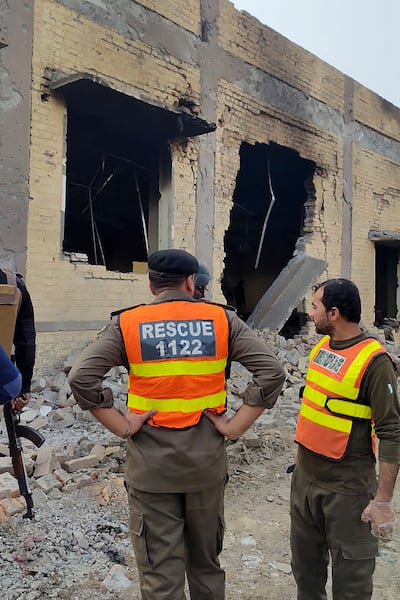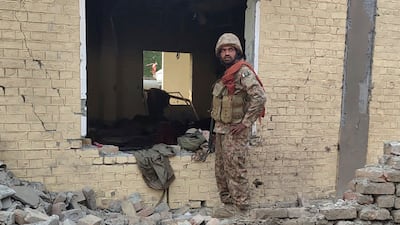Pakistan has lodged a protest with Afghanistan's authorities over Tuesday’s terrorist assault in Dera Ismail Khan district, in which suicide attackers killed at least 26 soldiers and wounded more than 30.
An affiliate of the Pakistani Taliban (TTP) claimed responsibility for the attack, one of the deadliest in the country. The TTP has strong links to the Afghan Taliban, who rule Afghanistan, and the attack occurred in a region near the two countries' border.
Islamabad has demanded that the Afghan Taliban take action to eliminate militant hideouts in Afghanistan's territory and hand over TTP leaders wanted for terrorist attacks.
But analysts say the previous government in Pakistan made a mistake when it held peace talks with the TTP, as the discussions gave the militants a chance to reorganise themselves.
Jailed former prime minister Imran Khan's Tehreek-e-Insaf party was seen as seeking closer ties with the TTP.
“Several key commanders of the TTP were released and numerous of its militants returned to their native areas in Pakistan as a result of those talks,” political analyst Dr Khadim Hussain told The National.
Dr Hussain is the former managing director of the Bacha Khan Trust Education Foundation research organisation.
“The parliament had very limited role in those peace talks. And when the talks failed, we witnessed its harmful consequences," he said.
The attacks come as Pakistan prepares to hold its general elections in February.
Dr Hussain said it would be an injustice if voting is delayed because of the unrest.
He said in the year 2008, the security situation was also very fragile, but elections were still held.
“If decisive action is not taken against the militants, such attacks would continue even after the elections,” he warned.
Dr Sarfraz Khan, a former director of Area Study Centre at Peshawar University, said the chances of an election could be affected by a surge in violence.
“I won’t link the Dera Ismail Khan blast to the coming elections but such incidents are a result of our country’s wrong policies. However, if bad incidents continue, then the coming elections may also be affected,” he said.
“The Taliban government in Afghanistan has also emboldened the militants fighting against Pakistani security forces. Terrorist incidents have increased since the Taliban formed a government in Kabul.”
Gun-and-bomb attack
Zeeshan Khan, chief of the police station in Daraban, told The National that the attackers comprised two suicide bombers and four others, all of them using sophisticated weapons.
“First they rammed the explosive-laden vehicle into the boundary wall of the army base, causing a huge blast that not only damaged the army base but also affected our police station," he said.
"After the vehicle blast, two bombers also detonated explosives around their bodies. The remaining terrorists entered the premises and started firing.”
The army base had been established in a school building, adjacent to the police station.
“Most of the casualties happened due to the blasts and firing by the militants. According to estimates of the area’s bomb disposal squad, about 100kg explosives were used in the attack,” he said.
Khalid Jan, a resident of the area, said the blasts have caused fears among the residents and also damaged nearby buildings.
“The window panes of houses were broken as a result of the blasts. One family living close the attack scene left the home as their house building developed cracks,” he said.
The attack was claimed by the Tehreek-e-Jihad-e-Pakistan (TJP).
TJP spokesman Mullah Mohammad Qasim said a group of its suicide bombers stormed the military compound at around 3am. It named one of the attackers as Maulvi Hassan Gandapur.
A security official who asked not to be named told The National that analysis would show the Tehreek-e-Jihad-e-Pakistan is part of the Tehreek-e-Taliban Pakistan, carrying a different name.
“They use the name of TTP whenever they like so, and sometimes they claim an incident by the name of TJP when it suits them,” he said.
He said the name of TJP was created because the Afghan Taliban face criticism whenever the TTP stages attack in Pakistan, since its militants mostly hide in Afghan border areas.
The specs
Price, base / as tested Dh100,000 (estimate)
Engine 2.4L four-cylinder
Gearbox Nine-speed automatic
Power 184bhp at 6,400rpm
Torque 237Nm at 3,900rpm
Fuel economy, combined 9.4L/100km
Tamkeen's offering
- Option 1: 70% in year 1, 50% in year 2, 30% in year 3
- Option 2: 50% across three years
- Option 3: 30% across five years
Benefits of first-time home buyers' scheme
- Priority access to new homes from participating developers
- Discounts on sales price of off-plan units
- Flexible payment plans from developers
- Mortgages with better interest rates, faster approval times and reduced fees
- DLD registration fee can be paid through banks or credit cards at zero interest rates
Sholto Byrnes on Myanmar politics
What are the main cyber security threats?
Cyber crime - This includes fraud, impersonation, scams and deepfake technology, tactics that are increasingly targeting infrastructure and exploiting human vulnerabilities.
Cyber terrorism - Social media platforms are used to spread radical ideologies, misinformation and disinformation, often with the aim of disrupting critical infrastructure such as power grids.
Cyber warfare - Shaped by geopolitical tension, hostile actors seek to infiltrate and compromise national infrastructure, using one country’s systems as a springboard to launch attacks on others.
Specs
Engine: Duel electric motors
Power: 659hp
Torque: 1075Nm
On sale: Available for pre-order now
Price: On request
How to protect yourself when air quality drops
Install an air filter in your home.
Close your windows and turn on the AC.
Shower or bath after being outside.
Wear a face mask.
Stay indoors when conditions are particularly poor.
If driving, turn your engine off when stationary.
Company%C2%A0profile
%3Cp%3E%3Cstrong%3ECompany%20name%3A%20%3C%2Fstrong%3EOutsized%0D%3Cbr%3E%3Cstrong%3EStarted%3A%20%3C%2Fstrong%3E2016%0D%3Cbr%3E%3Cstrong%3EFounders%3A%20%3C%2Fstrong%3EAzeem%20Zainulbhai%2C%20Niclas%20Thelander%2C%20Anurag%20Bhalla%20and%20Johann%20van%20Niekerk%20%0D%3Cbr%3E%3Cstrong%3EBased%3A%20%3C%2Fstrong%3EIndia%2C%20South%20Africa%2C%20South-East%20Asia%2C%20Mena%0D%3Cbr%3E%3Cstrong%3ESector%3A%3C%2Fstrong%3E%20Recruitment%0D%3Cbr%3E%3Cstrong%3EInvestment%20raised%3A%3C%2Fstrong%3E%20%241%20million%0D%3Cbr%3E%3Cstrong%3ECurrent%20staff%20count%3A%3C%2Fstrong%3E%2040%0D%3Cbr%3E%3Cstrong%3EInvestors%3A%20%3C%2Fstrong%3ESeed%20and%20angel%20investors%0D%3Cbr%3E%3C%2Fp%3E%0A
COMPANY PROFILE
Founders: Sebastian Stefan, Sebastian Morar and Claudia Pacurar
Based: Dubai, UAE
Founded: 2014
Number of employees: 36
Sector: Logistics
Raised: $2.5 million
Investors: DP World, Prime Venture Partners and family offices in Saudi Arabia and the UAE
Company profile
Name: Thndr
Started: October 2020
Founders: Ahmad Hammouda and Seif Amr
Based: Cairo, Egypt
Sector: FinTech
Initial investment: pre-seed of $800,000
Funding stage: series A; $20 million
Investors: Tiger Global, Beco Capital, Prosus Ventures, Y Combinator, Global Ventures, Abdul Latif Jameel, Endure Capital, 4DX Ventures, Plus VC, Rabacap and MSA Capital
Jetour T1 specs
Engine: 2-litre turbocharged
Power: 254hp
Torque: 390Nm
Price: From Dh126,000
Available: Now
ESSENTIALS
The flights
Fly Etihad or Emirates from the UAE to Moscow from 2,763 return per person return including taxes.
Where to stay
Trips on the Golden Eagle Trans-Siberian cost from US$16,995 (Dh62,414) per person, based on two sharing.
Profile of Whizkey
Date founded: 04 November 2017
Founders: Abdulaziz AlBlooshi and Harsh Hirani
Based: Dubai, UAE
Number of employees: 10
Sector: AI, software
Cashflow: Dh2.5 Million
Funding stage: Series A
COMPANY PROFILE
Name: Qyubic
Started: October 2023
Founder: Namrata Raina
Based: Dubai
Sector: E-commerce
Current number of staff: 10
Investment stage: Pre-seed
Initial investment: Undisclosed
If you go
The flights
There are direct flights from Dubai to Sofia with FlyDubai (www.flydubai.com) and Wizz Air (www.wizzair.com), from Dh1,164 and Dh822 return including taxes, respectively.
The trip
Plovdiv is 150km from Sofia, with an hourly bus service taking around 2 hours and costing $16 (Dh58). The Rhodopes can be reached from Sofia in between 2-4hours.
The trip was organised by Bulguides (www.bulguides.com), which organises guided trips throughout Bulgaria. Guiding, accommodation, food and transfers from Plovdiv to the mountains and back costs around 170 USD for a four-day, three-night trip.
The specs
- Engine: 3.9-litre twin-turbo V8
- Power: 640hp
- Torque: 760nm
- On sale: 2026
- Price: Not announced yet
Living in...
This article is part of a guide on where to live in the UAE. Our reporters will profile some of the country’s most desirable districts, provide an estimate of rental prices and introduce you to some of the residents who call each area home.
Profile
Company name: Marefa Digital
Based: Dubai Multi Commodities Centre
Number of employees: seven
Sector: e-learning
Funding stage: Pre-seed funding of Dh1.5m in 2017 and an initial seed round of Dh2m in 2019
Investors: Friends and family
Race card
6.30pm: Maiden (TB) Dh 82,500 (Dirt) 1.600m
7.05pm: Maiden (TB) Dh 82,500 (D) 2,000m
7.50pm: Handicap (TB) Dh 82,500 (D) 1,600m
8.15pm: The Garhoud Sprint Listed (TB) Dh 132,500 (D) 1,200m
8.50pm: The Entisar Listed (TB) Dh 132,500 (D) 2,000m
9.25pm: Conditions (TB) Dh 120,000 (D) 1,400m
MATCH INFO
Confederations Cup Group B
Germany v Chile
Kick-off: Thursday, 10pm (UAE)
Where: Kazan Arena, Kazan
Watch live: Abu Dhabi Sports HD
Green ambitions
- Trees: 1,500 to be planted, replacing 300 felled ones, with veteran oaks protected
- Lake: Brown's centrepiece to be cleaned of silt that makes it as shallow as 2.5cm
- Biodiversity: Bat cave to be added and habitats designed for kingfishers and little grebes
- Flood risk: Longer grass, deeper lake, restored ponds and absorbent paths all meant to siphon off water
Specs
Engine: 51.5kW electric motor
Range: 400km
Power: 134bhp
Torque: 175Nm
Price: From Dh98,800
Available: Now
The%20specs%20
%3Cp%3E%3Cstrong%3EEngine%3A%20%3C%2Fstrong%3E2.0-litre%204cyl%20turbo%0D%3Cbr%3E%3Cstrong%3EPower%3A%20%3C%2Fstrong%3E261hp%20at%205%2C500rpm%0D%3Cbr%3E%3Cstrong%3ETorque%3A%20%3C%2Fstrong%3E400Nm%20at%201%2C750-4%2C000rpm%0D%3Cbr%3E%3Cstrong%3ETransmission%3A%20%3C%2Fstrong%3E7-speed%20dual-clutch%20auto%0D%3Cbr%3E%3Cstrong%3EFuel%20consumption%3A%20%3C%2Fstrong%3E10.5L%2F100km%0D%3Cbr%3E%3Cstrong%3EOn%20sale%3A%20%3C%2Fstrong%3ENow%0D%3Cbr%3E%3Cstrong%3EPrice%3A%20%3C%2Fstrong%3EFrom%20Dh129%2C999%20(VX%20Luxury)%3B%20from%20Dh149%2C999%20(VX%20Black%20Gold)%3C%2Fp%3E%0A
The Sand Castle
Director: Matty Brown
Stars: Nadine Labaki, Ziad Bakri, Zain Al Rafeea, Riman Al Rafeea
Rating: 2.5/5
UAE currency: the story behind the money in your pockets
Fines for littering
In Dubai:
Dh200 for littering or spitting in the Dubai Metro
Dh500 for throwing cigarette butts or chewing gum on the floor, or littering from a vehicle.
Dh1,000 for littering on a beach, spitting in public places, throwing a cigarette butt from a vehicle
In Sharjah and other emirates
Dh500 for littering - including cigarette butts and chewing gum - in public places and beaches in Sharjah
Dh2,000 for littering in Sharjah deserts
Dh500 for littering from a vehicle in Ras Al Khaimah
Dh1,000 for littering from a car in Abu Dhabi
Dh1,000 to Dh100,000 for dumping waste in residential or public areas in Al Ain
Dh10,000 for littering at Ajman's beaches
The specs
AT4 Ultimate, as tested
Engine: 6.2-litre V8
Power: 420hp
Torque: 623Nm
Transmission: 10-speed automatic
Price: From Dh330,800 (Elevation: Dh236,400; AT4: Dh286,800; Denali: Dh345,800)
On sale: Now
Match info
Arsenal 0
Manchester City 2
Sterling (14'), Bernardo Silva (64')

